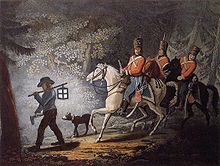Johann Rall
Johann Gottlieb Rall (* 1725 (?); † December 27, 1776 near Trenton , New Jersey , USA ) was colonel of an infantry regiment of the Hesse-Kassel troops, which due to subsidy obligations for Great Britain's King George III. fought in the American Revolutionary War.
Origin and military career
Johann Gottlieb Rall was born as a " soldier's child ", probably in 1725 (exact dates are not known) as the son of Captain Joachim Rall from Stralsund , who served in the Regiment of Major General von Donop. The first mention Ralls appear on March 1, 1740 as new Kadett (cadet) of the same regiment, which at that time as a regimental colonel Prince Casimir of Isenburg-Birstein was entered. It was promoted to ensign on July 25, 1741 , on August 28, 1745 to lieutenant (Lieutenant) and on May 10, 1753 to captain (Capitaine) . On May 7, 1760 he was made major under Major General von Bischhausen and in January 1763 transferred to the Stein garrison regiment, where he was appointed lieutenant colonel. On April 22nd, 1771, he was transferred as an "overcompleted Colonel" to Infantry Regiment No. 14 (von Mansbach Grenadier Regiment). There he became head of the regiment in January 1772. During all these years he fought in the Wars of the Austrian Succession and took part in campaigns in Bavaria , on the Rhine , in the Netherlands and in Scotland . He fought throughout the Seven Years' War and was involved in many battles according to his regular role. From September 1771 to August 1772 he was given leave of absence to Russia and fought for Catherine the Great under Orlov in the fourth Russian Turkish War .
American War of Independence
In 1776 the Rall Grenadier Regiment in the 1st Division under General von Heister was one of the approximately 12,000 men who went to the American War of Independence for Great Britain.
In America, Rall was involved in the battle at Flatbush , the Battle of White Plains (against Washington), the Battle of Long Island , as well as a leading role in the capture of Fort Washington . He has received several awards for his many years of loyal service, especially in America he has repeatedly attracted attention for his extraordinary bravery.
The Hessian regiments encamped in and around Trenton were defeated by the American Continental Army under General George Washington , who later became the first President of the USA, in a surprise attack on December 26th at the Battle of Trenton .

Rall had omitted the entrenchment (military security of a location) of Trenton, which made the surprise attack by Washington possible. Because of the previous, relatively easy victories against the American "rebels", he underestimated the courage of the American settlers fighting for their freedom. They took advantage of the additional advantage of the date: The Hessians had extensively celebrated Christmas and it is reported that Rall was still "in stocking socks" when he was brought to the news of the American attack. Several eyewitnesses reported that on December 24th he even received a written warning from an American loyal to the king about the impending attack, but crumpled up the note and continued playing cards. Rall was fatally wounded in the battle by a shot and died (according to the files of the Marburg State Archives ) late in the evening in his headquarters, the "House of Stacy Potts" now in Warren Street, then King Street. General Washington and General Greene paid a final military honor to the dying colonel after the battle. Lying dying, Rall is said to have regretted disregarding the written warning: "If I had read it, I wouldn't be here now."
Rall was buried in an anonymous grave in the graveyard of the first Presbyterian Church in Trenton on what was then East State Street.
Despite his previous merits, Rall fell posthumously out of favor with his commanders due to his military misjudgments in Trenton. The victory of the continental armed forces over the dreaded Hessian associations boosted the morale of the victorious party and marked a turning point in the war of independence.
See also: Soldiers 'trade , soldiers' trade under Landgrave Friedrich II of Hessen-Kassel
literature
- Sandra Paretti : The Winter That Was a Summer (historical novel)
Movies
- Winter That Was a Summer , three-part television film from 1976. The character of Colonel Rall was played by the actor Heinz Baumann .
Web links
- Bernhard von Poten : Rall, Johann Gottlieb . In: Allgemeine Deutsche Biographie (ADB). Volume 27, Duncker & Humblot, Leipzig 1888, pp. 191-193.
- The Two Battles of Trenton BY FREDERICK L. FERRIS (from the "Trenton Historical Society")
| personal data | |
|---|---|
| SURNAME | Rall, Johann |
| ALTERNATIVE NAMES | Rall, Johann Gottlieb |
| BRIEF DESCRIPTION | Colonel |
| DATE OF BIRTH | uncertain: 1725 |
| DATE OF DEATH | December 26, 1776 |
| Place of death | Trenton, New Jersey |

